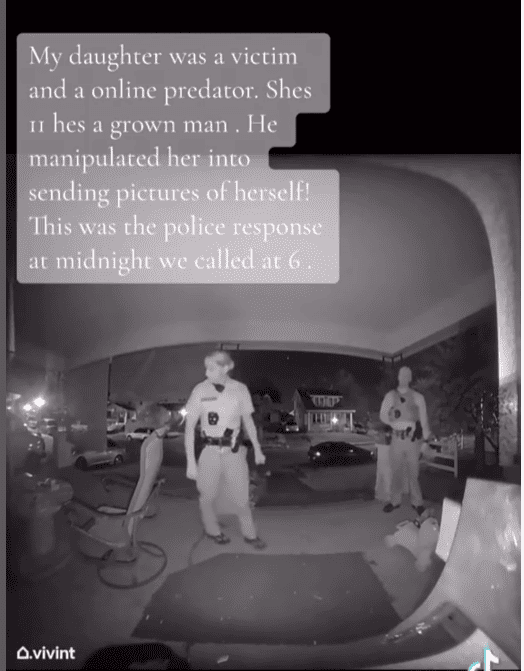
A father in Columbus, Ohio, became aware of his 11-year-old daughter being victimized online and being manipulated into sending sexually explicit material of herself to an adult predator. According to reports of a viral Tik-Tok video, the father called the Columbus Police Department around 6 PM, but officers didn’t respond until midnight.
When law enforcement arrived, a Ring camera caught the father telling officers he understood there wasn’t much they could do about the matter. Still, he would like them to talk with his daughter regarding the situation. One of the officers stated, ” I mean, she can probably get charged with child porn.” That statement has begun garnering a tornado of outrage and is the reason for this blog post today.
The Events in Question
First and foremost, let’s address the simple fact this child was victimized. Someone manipulated her into exposing herself like no child should ever be. Without knowing the specifics of the crime, we can only guess what images the child created and how much of her identity was tied up in those vile images. This incident is an action that could haunt her for years to come.
The child’s father did the right thing in contacting law enforcement. In online child abuse cases, digital evidence can disappear, and the sooner law enforcement is made aware of it, the greater the chances of identifying the perpetrator increases.
The police officer’s response is understandably shocking. Legally, the officer is technically correct. What the child did was manufacture child sexual abuse material. There is no doubt about that simple fact. In Ohio, sexually graphic material depicting anyone under 18 is, by law, child sexual abuse material ( CSAM). Factually speaking, the child made the content. However, charging the child would not have been justice.
If you view the video of the officer’s interaction with the father, it was an incredibly brief interaction. From the tone of the officer’s voice and the clipped nature of her responses to the father, I could tell she didn’t want to be there. I know the feeling, with long shifts and a ton of paperwork to handle when you return to the station. Yet, you have to remember the public expects you to be a professional.
The officer never was serious about charging the child. It was her way of ending the matter to move on to her next call. Yet it could negatively impact her career and the public’s perception of those charged with protecting them.
Victimizing the Victim
As an ICAC detective, I remember getting asked on the stand in court once by a defense attorney why his client’s ex-girlfriend wasn’t charged with providing his client with CSAM ( at his client’s request, mind you). The girlfriend was a 15-year-old child whom his client had verbally, mentally, and physically abused for a year. My response was, ” I don’t make a habit of charging the victims.”
Law Enforcement has a lot of leeway when it comes to charging people. In Georgia, a child 12-year-old couldn’t be charged, so it’s a moot point. However, I wouldn’t charge the victim even if she could be charged. In charging her, would justice be served? No. Absolutely not. Above all else, that is what law enforcement should be striving for: upholding justice.
Whatever the reason, the officer not only tarnished the image of law enforcement in general by her conduct, but she also sent a message to that Dad and his daughter not to come asking for help from the Columbus Police Department.
Take Away
Long and short, folks, this conduct is not the norm of law enforcement. Officers are people who have their bad days just like anyone else. However, the public expects more from us, and they were let down.
For parents reading this, I can not stress enough how important it is to tell the police when you learn your children are being victimized online. Take the opportunity to educate your children about the dangers of the internet and make them feel safe to come to you or law enforcement when they have been victimized.
There are dedicated professionals trained in investigating Internet Crimes against Children. When in doubt, seek them out; they will work to the best of their ability to help you and your children.